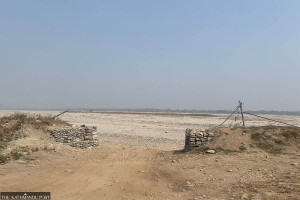Koshi Province
Bahundangi residents seek protection from marauding wild elephants
Experts say human-wildlife conflict is recurring because humans are encroaching on the bio-corridor.
Parbat Portel
Shyam Kumar Tamang, a 73-year-old man from Bahundangi in Jhapa, has been struggling to protect his life and properties from wild elephants for over four decades.
Tamang, who has faced conflicts with the tuskers multiple times, says he often expresses his concerns whenever he meets people’s representatives and government officers.
Local level elections in Nepal are around the corner and safety from wild elephants is on the top of Tamang’s list of demands that he means to put forward to party workers coming to his village seeking votes.
“Just for how long should we endure the problems of wild tuskers in our life?” asked Tamang. “I want the aspiring leaders to find a solution to this problem.”
Tamang’s hardship is not an isolated case. Elephant menace is rife in Bahundangi village, which spans across wards 1, 2, 3 and 4 of Mechinagar Municipality. Come every election, political leaders of various parties assure local residents that they’d take steps to control wild elephants and protect people’s lives and properties. But those assurances have yet to materialise; the problem so far has remained unresolved.
“Every politician knows our problem,” said Tamang. “They express their commitments to solve the problem during the election. But they forget their assurance soon after.”
People’s representatives never take the issue seriously once they get elected, locals complain.
“A herd of wild elephants enter the settlement from India when night falls. Our own settlement is turning into an open zoo,” said Dal Bahadur Karki, another Bahundangi local.
Bahundangi is one of Nepal’s hardest-hit settlements by human-animal conflict. In the past 10 years, 50 people were killed and properties worth millions of rupees were destroyed by wild elephants in Bahundangi, according to Jhapa’s District Forest Office. Around 20 elephants were also killed during the same time.
Voters in Bahundangi say they will cast their vote for the party and candidates with concrete plans to solve the problem without causing harm to the animals.
Krishna Maya Khatri, another local, said that while her village has seen progress in terms of infrastructure development, the problem caused by elephants remains unresolved.
“Dusty roads have been blacktopped. The problem of drinking water has also been solved to some extent. What is stopping the parties and their leaders from solving the problem of elephants?” said Khatri, whose family had been growing crops in around four bighas of land that they had on lease until two years back. “The tuskers completely destroyed the crops two years ago and we gave up cultivating crops.”
Owing to elephant menace, many farmers in Bahundangi started planting tea instead of paddy and other crops. But the returns from tea are meagre, say farmers.
“The cost of producing tea leaves is constantly increasing but the farmers do not get a suitable price for their products,” said Min Bahadur Karki, a tea farmer from Bahundangi. The farmers demand that the municipality provide them subsidies to grow tea leaves.
Residents of Bahundangi have been living under constant fear of wild elephants for years. Efforts made so far to curb the problem have not been effective. Last year, with financial support from the World Bank, the federal government installed electric fencing in the area at around Rs 20 million.
But that measure has proven to be ineffective and the fencing itself is disintegrating, said Bimal Khadka, a local resident.
“The solar batteries are not functional now while the wires are disconnected and stolen in some places. Neither the municipality nor the ward office takes initiatives to preserve and repair the electric fencing built by spending a huge amount of money,” Khadka said.
According to conservationists, Bahundangi and its surrounding areas are the corridor for elephant movement. Studies show that elephants from Assam and West Bengal in India travel to Koshi Tappu Wildlife Reserve in Nepal through Bahundangi. Experts say that instances of human-wildlife conflict are recurring because of the encroachment of the bio-corridor by humans over the years. There are around 1,800 households in Bahundangi.
Speaking to the Post, Bimal Acharya, mayor of Mechinagar Municipality, admitted that the local unit has been unable to work effectively to control elephant menace in the Bahundangi area. “We attempted to solve the elephant problem. But the municipality could not work as expected,” said Acharya.




 10.03°C Kathmandu
10.03°C Kathmandu











